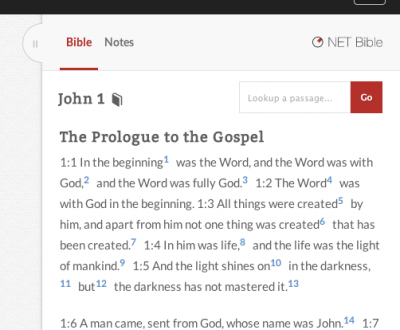Ecclesiastes 9:15: Plowing new ground
The NET Bible as a translation has been able to plow new ground in two major ways: content and format. Because we have a unique format with extensive notes which explain the translation, we can express valid exegetical decisions which might not be very traditional. One example brought to my attention recently was Ecclesiastes 9:15, which reads like this in the NET Bible:
The NET Bible as a translation has been able to plow new ground in two major ways: content and format. Because we have a unique format with extensive notes which explain the translation, we can express valid exegetical decisions which might not be very traditional. One example brought to my attention recently was Ecclesiastes 9:15, which reads like this in the NET Bible:
“However, a poor but wise man lived in the city, and he could have delivered the city by his wisdom, but no one listened to that poor man.”
Without comparing this to other versions, you might not realize how novel this translation is. Compare this, for example, to the NASB and you can see the difference clearly:
“But there was found in it a a poor wise man and he delivered the city by his wisdom. Yet no one remembered that poor man.”
At issue is whether the man delivered the city or not. In the NASB he did in fact do so but was later ignored, but in the NET Bible he could have but did not because he was ignored. Thankfully we include a note which explains why we adopted this interpretation:
tn Or “he delivered.” The verb וּמִלַּט (umillat, from מָלַט, malat, “to deliver”) is functioning either in an indicative sense (past definite action: “he delivered”) or in a modal sense (past potential: “he could have delivered”). The literal meaning of זָכַר (zakhar, “to remember”) in the following line harmonizes with the indicative: “but no one remembered that poor man [afterward].” However, the modal is supported by v. 16: “A poor man’s wisdom is despised; no one ever listens to his advice.” This approach must nuance זָכַר (“to remember”) as “[no one] listened to [that poor man].” Most translations favor the indicative approach: “he delivered” or “he saved” (KJV, RSV, NRSV, NAB, ASV, NASB, MLB, NIV); however, some adopt the modal nuance: “he might have saved” (NEB, NJPS, NASB margin).
This note explains well why we chose the translation we did, and it illustrates two things the NET Bible does that distinguishes it from other translations, that is, content and format.



